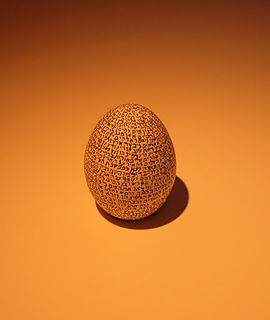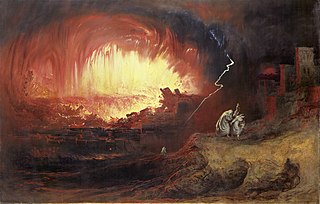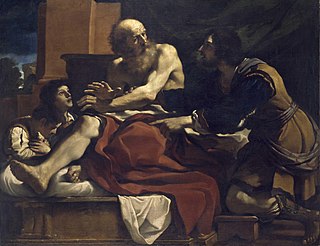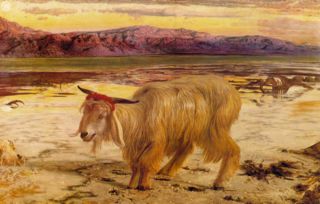Related Research Articles

Judah ha-Nasi or Judah I, was a second-century rabbi and chief redactor and editor of the Mishnah. He lived from approximately 135 to 217 CE. He was a key leader of the Jewish community during the Roman occupation of Judea.
Shim‘on ben Lakish, better known by his nickname Reish Lakish, was an amora who lived in the Roman province of Syria Palaestina in the third century. He was reputedly born in Bosra, east of the Jordan River, around 200 CE, but lived most of his life in Sepphoris. Nothing is known of his ancestry except his father's name.

Bereshit, Bereishit, Bereshis, Bereishis, B'reshith, Beresh't, Beresheet, or Bereishees is the first weekly Torah portion in the annual Jewish cycle of Torah reading. The parashah consists of Genesis 1:1–6:8.

Vayeira, Vayera, or Va-yera is the fourth weekly Torah portion in the annual Jewish cycle of Torah reading. It constitutes Genesis 18:1–22:24. The parashah tells the stories of Abraham's three visitors, Abraham's bargaining with God over Sodom and Gomorrah, Lot's two visitors, Lot's bargaining with the Sodomites, the flight of Lot, the destruction of Sodom and Gomorrah, how Lot's daughters became pregnant by their father, how Abraham once again passed off his wife Sarah as his sister, the birth of Isaac, the expulsion of Hagar, disputes over wells, and the binding of Isaac.

Noach, Noiach, Nauach, Nauah, or Noah is the second weekly Torah portion in the annual Jewish cycle of Torah reading. It constitutes Genesis 6:9–11:32. The parashah tells the stories of the Flood and Noah's Ark, of Noah's subsequent drunkenness and cursing of Canaan, and of the Tower of Babel.

Tol'dot, Toldos, or Tol'doth is the sixth weekly Torah portion in the annual Jewish cycle of Torah reading. The parashah tells of the conflict between Jacob and Esau, Isaac's passing off his wife Rebekah as his sister, and Isaac's blessing of his sons.

Vaychi, Vayechi or Vayhi is the twelfth weekly Torah portion in the annual Jewish cycle of Torah reading and the last in the Book of Genesis. It constitutes Genesis 47:28–50:26. The parashah tells of Jacob's request for burial in Canaan, Jacob's blessing of Joseph's sons Ephraim and Manasseh, Jacob's blessing of his sons, Jacob's death and burial, and Joseph's death.

Vayetze, Vayeitzei, or Vayetzei is the seventh weekly Torah portion in the annual Jewish cycle of Torah reading. It constitutes Genesis 28:10–32:3. The parashah tells of Jacob's travels to, life in, and return from Haran. The parashah recounts Jacob's dream of a ladder to heaven, Jacob's meeting of Rachel at the well, Jacob's time working for Laban and living with Rachel and Leah, the birth of Jacob's children, and the departure of Jacob's family from Laban.

Vayeshev, Vayeishev, or Vayesheb is the ninth weekly Torah portion in the annual Jewish cycle of Torah reading. The parashah constitutes Genesis 37:1–40:23. The parashah tells the stories of how Jacob's other sons sold Joseph into captivity in Egypt, how Judah wronged his daughter-in-law Tamar who then tricked him into fulfilling his oath, and how Joseph served Potiphar and was imprisoned when falsely accused of assaulting Potiphar's wife.

Terumah, Terumoh, Terimuh, or Trumah is the nineteenth weekly Torah portion in the annual Jewish cycle of Torah reading and the seventh in the Book of Exodus. The parashah tells of God's instructions to make the Tabernacle and its furnishings. The parashah constitutes Exodus 25:1–27:19. It is made up of 4,692 Hebrew letters, 1,145 Hebrew words, 96 verses, and 155 lines in a Torah Scroll. Jews in the Diaspora read it the nineteenth Sabbath after Simchat Torah, generally in February and rarely in early March.

Tzav, Tsav, Zav, Sav, or Ṣaw is the 25th weekly Torah portion in the annual Jewish cycle of Torah reading and the second in the Book of Leviticus. The parashah teaches how the priests performed the sacrifices and describes the ordination of Aaron and his sons. The parashah constitutes Leviticus 6:1–8:36. The parashah is made up of 5,096 Hebrew letters, 1,353 Hebrew words, 97 verses, and 170 lines in a Torah scroll. Jews read it the 24th or 25th Sabbath after Simchat Torah, generally in the second half of March or the first half of April.

Acharei Mot is the 29th weekly Torah portion in the annual Jewish cycle of Torah reading. It is the sixth weekly portion in the Book of Leviticus, containing Leviticus 16:1–18:30. It is named after the fifth and sixth Hebrew words of the parashah, its first distinctive words.

Behaalotecha, Beha'alotecha, Beha'alothekha, or Behaaloscha is the 36th weekly Torah portion in the annual Jewish cycle of Torah reading and the third in the Book of Numbers. The parashah tells of the Menorah in the Tabernacle, the consecration of the Levites, the Second Passover, how a cloud and fire led the Israelites, the silver trumpets, how the Israelites set out on their journeys, the complaints of the Israelites, and how Miriam and Aaron questioned Moses. The parashah comprises Numbers 8:1–12:16. It is made up of 7,055 Hebrew letters, 1,840 Hebrew words, 136 verses, and 240 lines in a Torah Scroll.
Jose ben Halafta or Yose ben Halafta was a tanna of the fourth generation. He is the fifth-most-frequently mentioned sage in the Mishnah. Of the many Rabbi Yose's in the Talmud, Yose Ben Halafta is the one who is simply referred to as Rabbi Yose.

Va'etchanan is the 45th weekly Torah portion in the annual Jewish cycle of Torah reading and the second in the Book of Deuteronomy. It comprises Deuteronomy 3:23–7:11. The parashah tells how Moses asked to see the Land of Israel, made arguments to obey the law, recounted setting up the Cities of Refuge, recited the Ten Commandments and the Shema, and gave instructions for the Israelites' conquest of the Land.

V'Zot HaBerachah, VeZos HaBerachah, VeZot Haberakha, V'Zeis Habrocho, V'Zaus Haberocho, V'Zois Haberuchu, Wazoth Habborocho, or Zos Habrocho is the 54th and final weekly Torah portion in the annual Jewish cycle of Torah reading and the 11th and last in the Book of Deuteronomy. It constitutes Deuteronomy 33:1–34:12. The parashah sets out the farewell Blessing of Moses for the 12 Tribes of Israel and concludes with the death of Moses.

Levi ben Sisi or Levi bar Sisi was a Jewish scholar, one of the semi-tannaim of the late 2nd century and early 3rd century.
Rabbi Ammi, Aimi, Immi is the name of several Jewish Talmudists, known as amoraim, who lived in the Land of Israel and Babylonia. In the Babylonian Talmud the first form only is used; in the Jerusalem Talmud all three forms appear, Immi predominating, and sometimes R. Ammi is contracted into "Rabmi" or "Rabbammi".
Joshua ben Hananiah, also known as Rabbi Yehoshua, was a leading tanna of the first half-century following the destruction of the Temple. He is the seventh-most-frequently mentioned sage in the Mishnah.
Rabbi Isaac Nappaha, or Isaac the smith, was a rabbi of the 3rd-4th centuries who lived in the Galilee.
References
- ↑ Between Rome and Babylon: Studies in Jewish Leadership and Society, Aharon Oppenheimer and Nili Oppenheimer
- ↑ Genesis Rabbah 94
- ↑ Babylonian Talmud Bava Batra 116a; Megillah 27a; Shevuot 18b
- ↑ Grätz, "Gesch." 4:263; Frankel, "Mebo," 91b; Weiss, "Dor," 3:60; Bacher, "Ag. Pal. Amor." 1:124.
- ↑ Exodus Rabbah 6; Ecclesiastes Rabbah 7:7; Genesis Rabbah 94
- ↑ Jerusalem Talmud Taanit 66c.
- ↑ Talmud , b. Berakhot 7a; Talmud , b. Avodah Zara 4b
- ↑ Babylonian Talmud Yoma 19b
- ↑ Jerusalem Talmud Berakhot 9c
- ↑ Ecclesiastes Rabbah 7:7
- ↑ Babylonian Talmud Kiddushin 33b
- ↑ Jerusalem Talmud Berakhot 9a
- ↑ Jerusalem Talmud Terumot 46b; Genesis Rabbah 94.
- ↑ Genesis Rabbah 33.
- ↑ Babylonian Talmud Kiddushin 33b
- ↑ For evidence that such friendship once existed, see Babylonian Talmud Eruvin 65b; Jerusalem Talmud Pesachim 32a.
- ↑ Babylonian Talmud Nedarim 42b
- ↑ Shabbat 68a; Berachot 8b; Yevamot 9a
- ↑ Kiddushin 33b
- ↑ Pesikta 36a
- ↑ Babylonian Talmud Berakhot 51a
- ↑ Derekh Eretz Zuta 1
- ↑ "Court to Decide on Fate of Rabbi Yehoshua's Grave" . Retrieved 24 August 2009.
- ↑ "רצה לבנות צימר, ומצא את קברו של הריב"ל".
- ↑ Babylonian Talmud Shabbat 121b; Jerusalem Talmud Yoma 44d
- ↑ Midrash Tanhuma 28:5
- ↑ Babylonian Talmud Bava Batra 9b
- ↑ Weiss, "Dor," p. 60
- ↑ Jerusalem Talmud Shabbat 15c; Midrash Tehillim 22:4; Bacher, "Ag. Pal. Amor." 1:129, against Weiss, "Dor," 3:60, who assumes that the "pinkes" was the work of another rabbi of the same name.
- ↑ See, e.g., Abraham ibn Ezra and others on Exodus 15:1; see Exodus Rabbah 23.
- ↑ Pirkei Avot 6:6
- ↑ Babylonian Talmud Makkot 10a; Midrash Tehillim 122:2.
- ↑ Babylonian Talmud Megillah 27a
- ↑ Babylonian Talmud Berakhot 8a
- ↑ Leviticus Rabbah 16; Jerusalem Talmud Berakhot 9d
- ↑ Babylonian Talmud Berakhot 8a
- ↑ Babylonian Talmud Sotah 39b
- ↑ Babylonian Talmud Yoma 69b; Jerusalem Talmud Berakhot 11c; Jerusalem Talmud Megillah 74c.
- ↑ Babylonian Talmud Pesachim 85b; Sotah 38b
- ↑ Babylonian Talmud Eruvin 19a
- ↑ Babylonian Talmud Sanhedrin 91b
- ↑ Psalm 95:7.; Babylonian Talmud Sanhedrin 98a
- ↑ Midrash Tanhuma 9:1; Leviticus Rabbah 19
 This article incorporates text from a publication now in the public domain : Singer, Isidore; et al., eds. (1901–1906). "Joshua b. Levi". The Jewish Encyclopedia . New York: Funk & Wagnalls.
This article incorporates text from a publication now in the public domain : Singer, Isidore; et al., eds. (1901–1906). "Joshua b. Levi". The Jewish Encyclopedia . New York: Funk & Wagnalls.